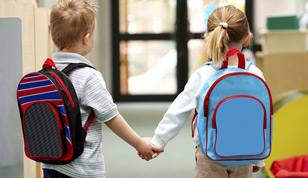Blog Categories
Search Blog
Blog Categories
Psychology Tips for Getting your Child JK Ready
If your child is preparing for Junior Kindergarten (JK) this fall, you may have already attended a Welcome to Kindergarten event at his new school. He may now have met his teacher, and may now have a sense of what the classroom will look like. Your child may even have had the opportunity to meet one or two of his classmates.
You may have been given a “welcome to kindergarten” package, detailing some of the early literacy, numeracy, fine motor and developmental skills that lay a good foundation for his first year in school. The practice and the reinforcement of pre-academic skills is important. As Boomerang Health’s OT’s blog suggests, there are many fun and engaging ways to work on these skills throughout the summer.
Starting “big kid” school, though, isn’t just about skill development and skill competence. It’s also all about adaptation, coping and confidence. When we talk about school readiness, we need to consider the social-emotional aspects of starting school on young children and how we can prepare them for this new environment.
1. Let your child’s teacher/school know in advance about his needs.
Your child’s teacher will be able to be a better teacher for your child if he or she knows what types of support need to be in place from the first day forward. Your child will have a much more positive school experience if the teachers know in advance what to anticipate, and how to respond. If he is likely to require behavioural or educational assistance in the classroom, it is important that the school be able to plan for this support ahead of time. Meeting with your child’s teacher beforehand also goes a long way in developing the home-school connection.
2. Work on enhancing your child’s independence in everyday activities and let him take risks.
Independence includes dressing, putting on shoes, and following routines, but also includes letting people know when he needs to go to the washroom, helping with chores, and making decisions on his own. Let your child explore safe environments, like the park. Let him play on his own. Independence in play allows children to expand on their decision-making abilities, their planning, and their resiliency.
3. At the park, the pool, on playdates or with family, recognize the importance of turn-taking, sharing, and self-regulation.
Find opportunities to bring his attention to his impact on others in play, to subtle social cues and facial expressions, while coaching and reinforcing prosocial behaviours. In addition, you may be able to find teachable moments in peer conflict, and can help navigate tricky situations. Enhancing your child’s emotional vocabulary also applies here.
4. Help your child practice “using his voice”.
At school, children are faced with having to communicate with many adults (teachers, librarians, a school principal) without the support of a parent to repeat, translate or speak for them. It’s therefore helpful to find opportunities to practice “speaking out and speaking up”, whether this is in greeting others, ordering food, or answering questions, in the presence of trusted adults (e.g., neighbors, the doctor or dentist, family friends). Some children also need help repeating themselves, if they aren’t initially understood. When practicing finding one’s voice, it’s easier to build up confidence if we start with more familiar adults and then expand our skills to less familiar ones.
5. Carefully and sensitively help him get used to crowds or large groups of children of different ages.
Lunch rooms and assemblies can be very overwhelming for the youngest students, so increasing your child’s comfort in crowded spaces is also valuable. While teachers will likely be very sensitive to this when working with young children, parents can also model what to do in different settings. You can support your child in acclimating to new surroundings so that these environments don’t feel so overwhelming.
6. Find times to talk about Kindergarten, but remember to “play it cool”.
While you may be thinking about JK daily throughout the summer, your child doesn’t need to be reminded about it every day. While children benefit greatly from preparation and familiarity, too much emphasis on school can be stifling, pressure-filled and may ultimately backfire by creating additional anxiety. If your child seems interested, provide him with the information he is looking for by highlighting the things he can look forward to and the types of activities he will get to explore. If you feel he’s resisting discussion, don’t push it. Instead, follow your child’s lead. While we want to make sure he has a sense of what’s coming, we don’t have to talk about it all the time. Other ways to prepare without heavy discussions include:
- Hanging out in the school playground this summer
- Opening up the old photo albums and showing pictures of yourself as a child
- Involving your child come August, when it’s time to purchase school supplies, backpacks, lunch bags and clothes/uniforms
- Reading books together (see next tip)
7. Incorporate books about Kindergarten into your child’s book rotation.
There are so many great books about starting Kindergarten that your child will enjoy. Some suggestions include:
- Adventure Annie Goes to Kindergarten – Toni Buzzeo
- The Kissing Hand – Aubrey Penn
- The Night Before Kindergarten – Natasha Wing
- Wemberley Worried – Kevin Henkes
- Kindergarten Rocks – Katie Davis
- I am Absolutely Too Small for School – Lauren Child
- Welcome to Kindergarten – Anne Rockwell
- First Day Jitters – Julie Danneberg
8. Sometimes we get so swept up in the big changes that are coming that we don’t emphasize enough what will be staying the same.
Make sure to emphasize to your child of all the things that aren’t changing, even though he is starting school (e.g., mornings, evenings, weekends, routines, relationships). A sense of stability is critically important, and it’s never a bad idea to make that constancy explicit to a child, even if it seems quite obvious. One-on-one play time together, as a means to convey safety and security, can help too.
Starting JK is both exciting and daunting for parents and children alike. Keeping in the mind the social-emotional impact of such a change is very important. Hopefully these tips can help you prepare your child for a positive introduction to school this September.
FYI – Boomerang Health will be offering a school readiness camp at the end of August, called Wheels on the Bus. This week long, half-day program, is appropriate for children ages 3 and 4 who are about to enter JK. Feel free to call us for more information or to register your child.






